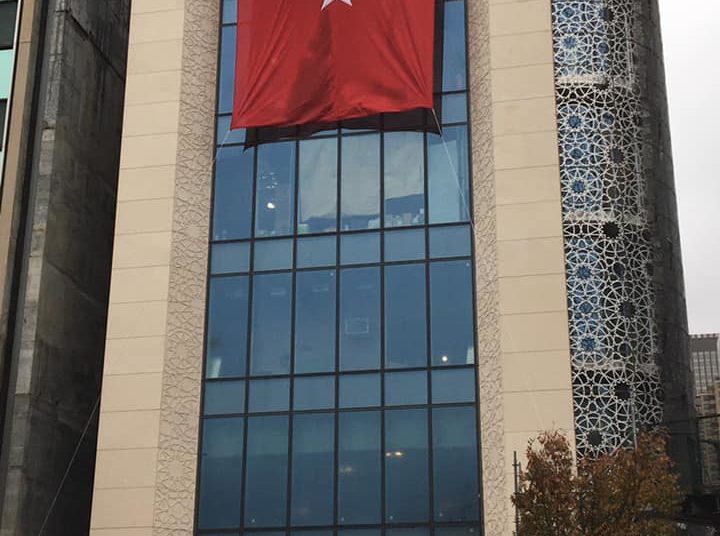Nordic Monitor
Turkish diplomatic missions in the United States are continuing to profile critics of President Recep Tayyip Erdoğan in parallel to an ongoing witch-hunt in Turkey, a Turkish Foreign Ministry document obtained by Nordic Monitor has revealed.
According to the communiqué, Turkey’s consulate general in New York has listed a Turkish national who applied for a power of attorney in August to authorize a lawyer in Turkey to sell their property. However, the consulate general staff had seen a note about the applicant on the online Risk Notification and Inquiry Screen, which was created by the General Directorate of Land Registry and Cadastre (Tapu ve Kadastro Genel Müdürlüğü).
Turkish diplomats in New York then collected information on the Turkish citizen and their family members and dispatched a file including their address and contact details to the foreign ministry in Ankara.
The information note conveyed by the Turkish Consulate General in New York was circulated by Mustafa Barış Elmener, head of the ministry’s directorate general for consular affairs, to the justice and interior ministries, the Turkish national police and the intelligence agency (MIT) on September 2.
The foreign ministry document revealed the fact that notes added into the online Turkish cadastre information system have not only paved the way for asset seizures but also triggered judicial investigations into government opponents living in Turkey and abroad.
Two-page document from the Turkish Foreign Ministry including an information note dispatched by Turkish diplomats in New York:
Critics of the Erdoğan government, especially members of the Gülen/Hizmet movement, a group critical of the Turkish government, have been facing surveillance, harassment, threats of death and abduction since 2014, when then-Prime Minister and now President Erdoğan decided to scapegoat the group for his own legal troubles. He accuses the movement of being behind corruption investigations in 2013 and a coup attempt in July 2016, allegations the movement denies.
The crackdown on the movement intensified in the aftermath of the coup attempt. The assets and wealth of individuals, corporations and organizations that were seen as affiliated with the movement were branded as war spoils open to plunder.
In September Nordic Monitor released a circular from the Turkish Land Registry and Cadastre Directorate General that bypassed the judiciary to seize the assets of Erdoğan critics. The document has confirmed that plundering the assets and properties of Erdoğan critics has become so blatant that not even a court order is sought to carry it out, and local agencies have conducted such activities in accordance with the instructions from Ankara.
The communiqué, dated October 4, 2016, urged local branches to add notes into the online Risk Notification and Inquiry Screen identifying to whom the finance ministry, governors, district governors and police sent official reports in order to block the transfer of their assets. The communiqué revealed that those activities were launched following requests from administrative authorities and bypassed the judicial process.
Following the coup attempt the directorate general created the Risk Notification and Inquiry Screen in order to detect alleged members of the movement. While private properties were blocked in the Land Registry and Cadastre Information System (TAKBİS), premises belonging to universities, prep schools, dormitories, schools, foundations and associations were transferred to the General Directorate of Foundations and the Treasury.
The assets of Gülen-affiliated entities such as schools, universities, media outlets, companies and apartment buildings were confiscated or stolen by their new owners. Similar to Nazi Germany, their property was divided up among Erdoğan’s Islamists and their collaborators.
Turkey’s Savings Deposit Insurance Fund (TMSF) has taken over 885 private companies including major conglomerates such as Boydak Holding, the Koza Ipek Group, Kaynak Holding, Naksan Holding, Suvari Co, Dumankaya, Akfa, Orkide and Sesli, valued at close to $11 billion. No figures are available verifying how much personal wealth and how many assets were seized through the Erdoğan government’s use of the partisan judiciary.

Following the coup attempt, Turkish embassies and consulates became tools of spying in the hands of Turkey’s Islamist rulers. Turkish diplomatic and consular missions around the world have systematically spied on critics of President Erdoğan, profiled their organizations and listed their names as if they were part of a terrorist organization. Working as a teacher at Gülen-inspired schools or contributing to non-profit institutions affiliated with the movement abroad are considered to be acts of terrorism by the Erdoğan government. Spying activities by Turkish diplomatic missions result in serious consequences in the Turkish judicial system.
In February Foreign Minister Mevlüt Çavuşoğlu confirmed clandestine spying operations by Turkish diplomats on foreign soil. Çavuşoğlu said Turkish diplomats assigned to embassies and consulates have officially been instructed by the government to conduct such activities abroad. “If you look at the definition of a diplomat, it is clear. … Intelligence gathering is the duty of diplomats,” Çavuşoğlu told Turkish journalists on February 16, 2020 following the Munich Security Conference, adding, “Intelligence gathering and information collection are a fact.”
It is clear that Turkish diplomatic missions violate the domestic laws of receiving states and the principles of international law by conducting unlawful information-gathering campaigns and sweeping intelligence operations. Erdoğan’s envoys enjoyed the privileges and immunities described in the international conventions while they systematically spied on critics of the president, collected information on Turks living abroad and transmitted it to headquarters.












